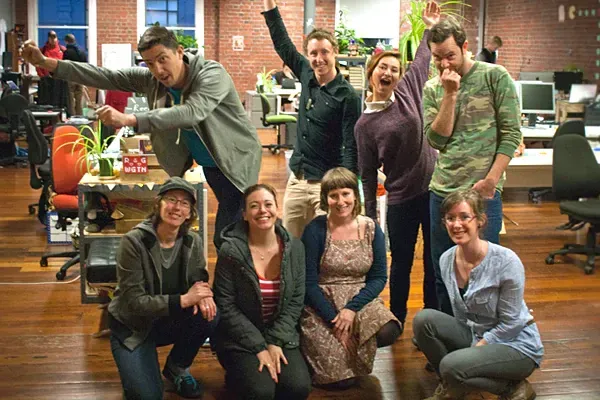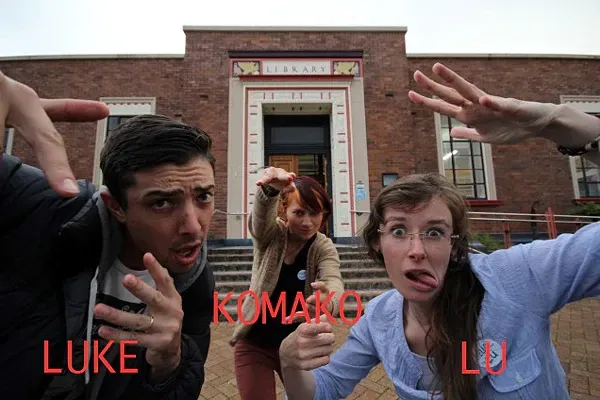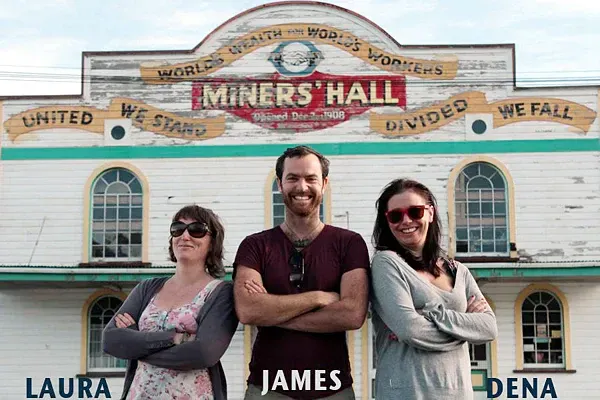Inspiring Stories filmmaking tips
Written by

Inspiring Stories is travelling the country to give young people skills and confidence in storytelling and filmmaking for change. Six of the young fillmakers running the workshops take time out of their travels to share some of their tips with The Big Idea.
* * *
For the third year in a row, Inspiring Stories is hitting the road with a crew of internationally award-winning young filmmakers to run workshops for secondary schools nationwide. The intensive one-day programme covers storytelling, camera, editing, and project development.
Komako Silver, James Muir, Dena Kennedy, Lu Davidson, Laura Honey and Luke Hedley are some of the filmmakers who have stepped up to the challenge to run the workshops.
To get you inspired they share their top filmmaking tips and tell us more about themselves.
Komako
1. Always be ready for anything. If you’re making a doco you have to start considering yourself a Ninja - you never know what’s about to happen, so you have to be active and on guard, so find your inner Ninja!
2. Prepare as much as you can but be willing to think on your feet. Something will always go wrong on a film set no matter how prepared you are, so you have to be flexible and have the ability to think quick. This is where our natural kiwi ingenuity is really valued on set and also makes you look pretty awesome in front of the rest of the crew if you can come up with a solution pronto.
3. Be creative! Everyone thinks that you have to be conservative when it comes to documentary filmmaking. They’re wrong! Documentary filmmaking is one of the few opportunities that you can really experiment with all kinds of stylistic techniques. Go for gold and have a party! It’s a wicked opportunity to explore your creative skills to challenge your audience about what a doco film is and how that story can be told.
James
1. Don’t be afraid of approaching people, just about everyone has something to say and wants their voice heard.
2. Build relationships with your talent, make friends and keep friends.
Dena
1. Make it on a subject you're passionate about.
2. Make sure you get good sound!
Lu
1. Everyone has access to the most unique stories found in their own backyard that nobody else in the world has the same access to. So why not begin with what you know? You might take it for granted but someone elsewhere will think it is amazing and chances are you will inspire them with your every-day-norms.
2. You don't have to just stick to one genre. If you don't want to make a 'traditional' doco, then push the boundaries. Bring in your favourite elements from genres and films that you already love, and you will end up creating your own new and different flavour. Make a film that you would like to watch.
Laura
1. Make your doco about something you are truly passionate about or inspired by!! It will shine through in your film and hopefully inspire your audience to a greater extent.
2. Always be on the look-out for potential documentary leads, and interesting or quirky characters. So many everyday people have really incredible stories to share! On our Inspiring Stories Road Trip I've enjoyed talking to the locals in each town, and kept a mental note of all the intriguing people and places I've encountered along the way.
Luke
1. Research, research and more research! Research is fun and the more you know about your subject matter before you start filming the better!
2. When you start filming don't be afraid to throw all your research out the window if the subject leads you in a new direction! (You'll end up learning new things anyway, which is also research!!)
|
Komako Silver From Hamilton, Komako is the youngest of the workshop crew with enthusiasm to spare and some fierce passions in place. She fell in love with cinema at age 10 when she watched Arabian Nights on television with her father. |
|
|
James Muir Sitting in a crowded theatre at a New York short film Festival and having the entire audience stand up and clap at the end of a film you’ve made must be a pretty awesome feeling. And it’s one that James Muir had recently when his film River Dog won best of the festival. Just one of the 10 awards it has picked up so far from around the world. |
|
|
Dena Kennedy At high school, Dena was told by her social studies teacher on career day that acting is not a viable career, and that there were no avenues to get there. She proved her teacher wrong, and within 5 years she played a lead in her first television show, and worked as an actor for ten years before moving onto the other side of the camera. Her motivation for working for Inspiring Stories is to help young people realise that nothing is out of reach, if you have the tenacity, the drive and the passion to follow it through. |
|
| Lu Davidson Lu likes to combine the worlds of art and science. She studied design and science simultaneously at Otago University, neglecting to tell her (academia loving) parents about the design degree. They didn’t know about it until they saw her at graduation with two hoods on. This just goes to show how self-motivated Lu is. When she found out about the Natural History Filmmaking post grad course she knew it was what she wanted to do with her life so worked as hard as she could to gain a coveted spot. Since then Lu has gone on to make documentaries for TVNZ and teach film to students in the Himalayas. Growing up between New Zealand and Asia, Lu has always been obsessed with animals. “I try and identify with animals that don’t really have human characteristics and translating that into film so other people can feel the way I do.” Lu loves the animal, insect and bird kingdom so much she can’t choose a favourite for fear of leaving the other ones out. She has recently done a lot of research with bats which gave her a real appreciation for “one of the most secret creatures we’ve got.” Lu has a strong affinity with the ocean and the mountains. Her mentor and role model Alison Ballance taught her about making the natural world sing through film. “When you show the mountains you make them alive. The mountains are talking for themselves.” |
|
|
Laura Honey Laura has seen some interesting things in her film career. From sewing up pro wrestler’s undies before their big bad battles for a TV series to the battle between locals in the Marlborough Sounds and a multi-national corporation. The locals were fighting against numerous salmon farms being installed in their idyllic waters. This project was personal for Laura as she is ardent about environmental issues. It culminated in a 30-minute documentary and a new affinity with the area. “What I really loved about my project was all the people I met along the way. Everyone was so open and welcoming to me. A lot of people I interviewed I stayed with and they gave me dinner. I’m still in contact with them now so whenever I’m in the area I can go visit them and they all live in beautiful locations.” |
|
| Luke Hedley
Luke likes that film can transport you to another place and time, giving you experiences that you might not have in your real life. |
- Inspiring Stories also runs a film competition every year, with a grand prize of $2000. The theme is 'young kiwis making a difference' and the deadline is July 31st.
Many of the young people involved in the workshops so far have been inspired to create their own entries.
More information on the film competition here:
The submission form is here:

